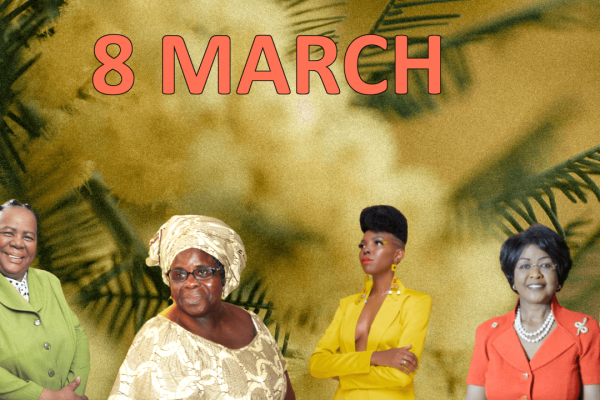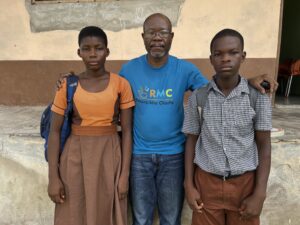INTRODUCTION
March 8 Women’s Day….or not. The Western view sees the African woman as a succubus, a housewife, uneducated, and chained. The reality, however, is quite different. Many charismatic women are standing up to this colonialist view. All this can be seen if we look at the origins. This anniversary derives from a large demonstration in St. Petersburg in 1917. Today, women in the tsarist capital took to the streets to demand an end to World War I. This article will examine five women who do not give up but fight for human rights. African women are the backbone of this continent. The voice of African women will be essential to the struggle to protect human rights. March 8: International Day of Women’s rights. Strong women, brave women, and women who struggle.
ARIKANA CHIHOMBORI QUAO
Dr. Arikana Chihombori-Quao, a diplomat, physician, and educator, recently attended the National Black Theatre in Harlem. “We need to come together. People must first decolonize the Black mind. It is essential to sincerely inventory who we are and how we were colonized; otherwise, the battle will be lost,” Dr. Chihombori-Quao told the audience. During his Speech at the HBCU Africa Homecoming Media Launch in June, he addressed the backlash by saying, “You may wonder why African leaders have done nothing about this deplorable situation, but let me tell you, my brothers and sisters, they have tried.” Chihombori-Quao added, “It is documented to date that in the 22 coups in which leaders have been assassinated, France had something to do with it.” “The colonists never left,” Ambassador Chihombori-Quao told the Amsterdam News. “There are various factors if you were to talk about why Africa is the way Africa is today. The reality is the colonizers have never left.
AMA ATA AIDOO
While a student, she wrote her first play, The Dilemma of a Ghost. It was about a Ghanaian man who returned from a stay in the United States with an African American wife. She focuses on the dismay of his family. The play initially staged in 1965, was published the following year, making Aidoo the first published African woman playwright. Aidoo wrote another play, Anowa, based on an old Ghanaian legend concerning the African slave trade, an issue she insists African writers continue to ignore. “The whole continent needs to go through a debriefing to move forward, but many Africans don’t want to deal with it.” In 1982 she was appointed minister of education in Ghana, making her the first woman to hold that position. She helped earn tremendous respect for female teachers. In 2000, recognizing the needs of women writers, Aidoo founded Mbaasem, a foundation dedicated to promoting the work of Ghanaian and African women writers. She currently serves as executive director.
ADELLE ONYANGO
Kenyan Adelle Onyango’s Speech went viral in France after she confronted President Emmanuel Macron during a panel discussion in Montpellier on Friday, October 8. In her Speech, Onyango accused France of living in “denial” of its “destructive past” during the colonial period. He went on to say that Africans had felt the pain of colonialism dailyy. Along with 11 other young Africans, the media personality urged France to support democratic renewal in countries where leaders hold power under “democratic dictatorships.” “What we end up with is skepticism about what exactly France stands for,” he said amid fierce applause at the gathering of some 3,000 Africans invited to the Montpellier rally. Senegalese blogger Cheikh Fall called on the president to stop cooperating with dictatorial presidents. “Understand that in trying to be like the world, we cannot be African. But in being African, we can change the world.”
NALEDI PANDOR
“We must combat persistent instability caused by poverty, high unemployment, and violent conflict in Africa. Massive opportunities await South Africa in promoting African trade, regional integration, and industrialization. To benefit from these opportunities, we must be seen as an inclusive country that practices social cohesion and is a home for all living there. Our Pan-African dream of Africa’s prosperity and development relies on mutual African support and African interdependence.” She also said: “The last African colony, Western Sahara, is still not free. Its resources are being plundered, and the international community remains silent in the face of this long-standing injustice. We believe it is time to exert maximum diplomatic pressure to ensure the promised referendum on Western Sahara’s self-determination is finally held.”. This is the Speech by the Minister of International Relations and Cooperation, Dr. Naledi Pandor, on the occasion of the Budget Vote.
FANNIE LOU HAMER
Fannie Lou Amer was an American voting and women’s rights activist. She was a community organizer and a leader in the civil rights movement. Fannie was the vice-chair of the Freedom Democratic Party, which she represented at the 1964 Democratic National Convention. This activist was a daring Black woman who turned up when Civil Rights Movement had already garnered much attention. Faced with the challenge of rallying low African-American voter numbers, Hamer actively took to organizing Mississippi Freedom Summer- a daunting task. Facing threats due to her involvement, Fannie Lou Hamer remained fearless, passionate about equality, and vocalized her beliefs through moving speeches at multiple conferences. Unsurprisingly, Fannie Lou Hamer captured the people’s imagination and left her mark in history books as an inspirational leader during this critical period.







